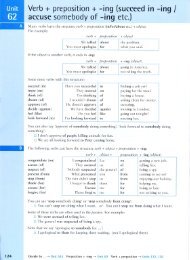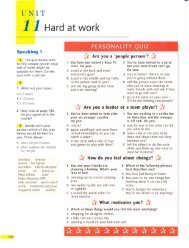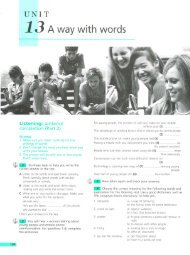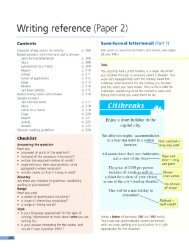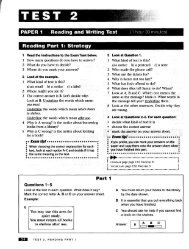Reading (1 hour 1 5 minutes)
Reading (1 hour 1 5 minutes)
Reading (1 hour 1 5 minutes)
Create successful ePaper yourself
Turn your PDF publications into a flip-book with our unique Google optimized e-Paper software.
PAPER 1<strong>Reading</strong> (1 <strong>hour</strong> 1 5 <strong>minutes</strong>)You are going to read a newspaper article about living and working in Antarctica. Choosethe most suitable heading from the list A-l for each part 1-7 of the article. There is oneextra heading which you do not need to use. There is an example at the beginning (0).Mark your answers on the separate answer sheet.A Avoiding human contactB Forced to remainC The most lonely place on earthD A choice of routineE FreezingtemperaturesF Alternative routesG Looking aheadH A varied communityI The need for human contactnp sEfF:r Fart * a*kiryou td tflhteft $rlffi{fitrit #terires w hin*ffi:ts pnns of an article.. 4eu9the text for general understanding and don't worry lf there are some words r*rlch youdon't recognise; focus on understanding the mrh goht of each paragraph.r Then look at the paragraph_headings;don't entpeet the nords from the te;c to match.,*Chec! your an$werb ca refu lly.'tftffiq;nr Uny mlgtt pebpfe:st balis gt*tlo* w6fit to e&id athers occ*sionrlly? , "., ',i':'ilM&8& Ihis talk$ abotrt bsifi*'fotcad tt rcmainf, W,h{ch paragraph t$ks ahr.rt psoBlf hflin$ 'l{@* Coutq,!!l$h*fidf$*,&rp${ndEsrtidsth$rilhdils *r'ti*l€ ir rbout llvinglnfu*rinq.;i,i.:.,.conditions?tMU t* This,mefitiont'*a varl*d comrnufiity'; Whlch paragraph illustrates ths urtdly $ I ''','Iw TEST 2, PAPER 1
cThe last ship of the season has left; the next will not behere until December. There will be eight months ofisolation, cut off from the rest of the world on the edgeof the world's coldest, remotest continent: Antarctica.rlInevitably, small social groups develop within thisisolated community. There is usually a group of smokers,a group of video watchers, a group of people who sit andchat. As people try to maintain contact with home so thecost ofphone bills increases, but in any case there isnothing else to spend money on.The people who spend the winter at Davis Station inAntarctica regard the departure of the last ship not withfear but with something like a feeling of relief. Gone arethe busy days of summer, the helicopters, the crowd ofpeople. Now life starts again.There are more than 40 research projects being carriedout in Antarctica but many of the scientists have left bythe time winter arrives. The station is home to physicists,biologists, weather observers, mechanics,communications technicians, electricians, carpenters,plumbers, a doctor and a chef. There is also a stationleader whose job it is to keep everyone happy andproductive and to look after all the paperwork. Whenmost of the team arrive each year in December, the sunnever sets. By the beginning of the following June it willnever rise, so people have to get used to many darkdays.:u:lIt is quite common for the sea to freeze during April andinstead of waves lapping the beach, thick plates of ice liftand move with the tide. Once the sea ice has beenchecked to see if it is strong enough to walk on, one canski over and fish through the holes. Eventually itbecomes strong enough for vehicles to drive on it andthe researchers can open up a new road system to enablethem to drive around the coast in <strong>minutes</strong>, to huts whichcould only be reached after <strong>hour</strong>s of walking in summer.Trips to the huts are the only means of physicallyescaping from life on the station. Some trips are forscience, others for recreation and a way of having somepersonal and private space. Some trips can be made onfoot or skis, but in winter they are usually in vehicles.It doesn't matter what <strong>hour</strong>s people choose to work solong as the work gets done, so they can start and finishwork at whatever times suit them. The first real meal ofthe day, a hot breakfast, is served at 10am. There is ahot lunch and a hot supper but putting on weight is apotential problem for many people. The doctor is thereto advise on diet and exercise and a gym is available tohelp people keep fit.There are no animals as they all leave for the winter, butin spring seals and seabirds and penguins arrive. Onlyhumans stay in Antarctica for the full year, and althoughtheir lives are comfortable they are still isolated andimprisoned. They have good food, comfortablebuildings, telephones, entertainment, the internet, butfor many months at a time no chance of leaving.TEST 2, PAPER 1E
qYouaregoingtoreadanarticleaboutoneyoungEnglishperson'sexperienceofa.gapyear', a year spent overseas, in China, between leaving school and going to university. Forquestions 8-14, choose the correct answer A, B, C or D.Mark your answers on the separate answer sheet.t6I am led into a large, whitewashed roomto face a jury of 99. They are arranged inrows, and we look at each other througha cloud of yellow chalk dust. They havenever met a foreigner before and eye menervously as I step forward. I am inChina for a year to work with 20-year-oldstudents learning English. It felt oddbeing younger than my students, but Inever felt too inexperienced to cope.It had not been an easy choice to take theopportunity of doing a gap year. I wasafraid of not being able to settle down toa life of studying when I returned and oflosing touch with my friends. But oncethe decision was made, I looked forsomewhere challenging to live and work,with the possibility of travelling aroundthe country at the end of my workplacement.I worked at a huge, concrete institute in acity with a million inhabitants and I grewto love it. The size of the class whichcould sometimes include up to 99students, of very mixed ability andenthusiasm, left me feeling exhausted,but rewarded.One of the best things about the workwas that I met hundreds of people, andfelt appreciated and welcomed by them -people who had had practically nocontact with the West. In China.everyone wants to be your friend.My best Chinese mate was Mr Chow, a35-year-old electronics teacher with ason, wife, and a cheerful face like a fullmoon. I helped him with his English andhe coached me at table tennis, and taughtme how to ride a motorbike. Best of all,he was a great storyteller, and some ofmy best nights were spent eating withhim and his family. In China I learnt thatfun takes on different forms.In the more remote areas of China wherelife and landscape have changed little inhundreds of years, you can really feel likea cross between a celebrity and a creaturefrom outer space. I've been on trainjourneys when kids have asked me to signtheir clothes, been on television a fewtimes - and just what do you say whenChinese men are stroking your legs,amazed by the fact that they are so hairy?So, what have I come away with? I hadno choice but to adapt, budget, bargainand become more independent. There'sno faster way to grow up than having tostand in front of those 99 students, allolder than yourself and tell someone offfor turning up late again to a lesson.Most of all I loved the experience ofliving in a different country and thechallenge of trying to understand it.4tjn TEST 2 PAPER .I
Tlp$filpQHbng Ahrays rcadwhat has come before aswell as what comes afterwith this kind ofquestion,Ans$on rs Don't bemislead by wordspotting;at thebeginning ofthetext the writer mentiansths fact that ihs str"ldent$eyed him'nervously'.8 What does the use of the word 'jury' suggest about the writer's feelings in line 2?A He thinks he has committed a crime.B The students already find him boring.C He cannot understand their behaviour.D l-!g knows they want to see what he is like.9 What does the word 'decision' in line 16 refer to?A going to universityB returning homeC going abroadD contacting friends10 Which phrase best sums up the writer's feelings about his job?A concerned and nervousB tired but fulfilledC enthusiastic but worriedD successful and excited11121314How do the 'hundreds of people' react to the writer? (line 29)A They were suspicious of him.B They were amused by him.C They were sociable to him.D They were puzzled by him.What does the writer suggest by saying 'fun takes on different forms' in line 43?A He was surprised at his enjoyment of simple things.B He got more fun from learning than teaching.C He missed Western forms of entertainment.D He enjoyed meeting his students outside lessons.The children wanted the writer to sign their clothes because he wasA famous.B unusual.C popular.D funny.What does the writer conclude about his gap year?A lt enabled him to learn Chinese.B He learnt how to control a class.C He learnt to cope with foreigners.D lt helped him become more mature.TEST 2, PAPER 1EI
You are going to read a magazine article about a man who used to work at London Zoo.Eight paragraphs have been removed from the article. Choose from the paragraphs A-lthe one which fits each gap 15-21. There is one extra paragraph which you do not needto use. There is an example at the beginning (0).Mark your answers on the separate answer sheet.RATTTING THE CAGEWhen Oliver Graham-Jones first arrived at London Zoo in 1951, he came acrossa number of dfficulties. The zoo had changed little since it was built in 1823 and the keepers wholooked after the animals were used to organising things their own way.oHowever, a new law changed all that in 1948 and onlyqualified vets were allowed to treat animals. Thekeepers, used to being in charge, disliked having a cleveryoung boss with new ideas.Today Mr Graham-Jones, now in his eighties, is againstanimals being in cages. 'In an ideal world, there wouldn'tbe places like London Zoo. We would have only safariparks as these are the best places to keep animals.'l$,He made such a fuss in the first year that many of thekeepers refused to speak to him. He quarrelled withalmost everybody and after a year the zoo managementdecided that his job would remain on a temporarycontract.!$On one occasion when Mr Graham-Jones ordered thatthe heating in the animal houses should be switched off,the keepers went on strike.Despite all the arguing, the young vet was responsiblefor some major new improvements and mostimportantly for setting up the zoo's animal hospital.'However, to be fair to London Zoo, the managementhas done the best possible and opened up the animalsareas as much as they can. But people nowadays havecars.'The situation is clearly different from 1948.Things have certainly changed. When Mr Graham-Jonesfirst joined the zoo he actually lived in the zoo grounds.nLater on he moved to live off site and eventually in 1966he left the zoo altogether and became a college lecturer.E TEST 2, PAPER 1
A'The lion and monkey houses were shut up at 4pm when the keepers wenthome, leaving all the heating turned on. This resulted in the overnighttemperatures being too high and, not surprisingly, a number of animalsbecame ill.'According to Mr Graham-Jones, the moment you start to put cages aroundanimals you've got a man-made artificial environment which doesn't suitanimals.'Nobody really wanted me,'said Mr Graham-Jones. 'The zoo keepers hadtheir own ideas about nutrition, about what the animals should eat and theseideas had been handed down over the years from keeper to keeper. It tooktwo years for me to settle in.'D'I didn't care if the job was temporary for 10 years; the zoo needed me and Iwas determined to improve the conditions for the animals.'He felt that he was at last in charge of a proper clinic where he could give theanimals the quality of care he felt they deserved. The facilities included a fullyequipped operating theatre in a clean and healthy environment.'They don't need London Zoo - they can go to the country and visit safariparks, which are much better for animals. I'm not anti-zoo, all I'm saying isthat places like this have served their purpose. Modern zoo keeping is ratherdifferent.'GHThey only ever called in a vet - someone who specialised in treating sickanimals - when it was absolutely necessary.The plan was a disaster. He ran out of money, decided that he didn't want tocontinue working as a vet and that he would re-train as a doctor.To enable him to look after the zoo's 800 animals he had a flat situatedbetween the seals and the hippos! Although very convenient, the flat wasdecidedly noisy, especially in the early morning.TEST 2, PAPER 1w
You are going to read a magazine article in which four different women talk about theimportance of their own personal space. For questions22-35, choose from the peopleA-D. The people may be chosen more than once. When more than one answer isrequired, these may be given in any order. There is an example at the beginning (0).Mark your answers on the separate answer sheet.Which of the womenspends her day in conversation with others?would like to take exercise during the day?worries she might upset other people?builds in a special time to be alone at home?escapes outside to find peace and quiet?likes to prepare mentally for what is to come?gets annoyed if she has no time to herself?thinks other people may feel equally stressed?relies entirely on her home environment for space?feels pressurised by too many demands at work?relies on personal space early in the day?creates space for herself even if she is not at home?has no time to relax during her working day?l-sl-r]feTl__lwr-_-ll-ff]]rst___-]t-fii-_ltffT--lrffi__lIT1T--]tsEl-_ll$r1__-li4i-_lrEJ__lnp$Lsfr$dur u*'Look forsomeon€ exsres$ing a wi*h.${4&q te ilhat wprd expresse* tlr* same idea as 'pr6ce and,{uief?SFtdm t$ Look for hsw a list of things cotrvsys how thc person ftels.E TEST 2, PAPER 1
I always need to get away from other people at somepoint during the day. lt's not that I don't get on withothers, l've loads of friends. But I work in a reallybusy office in the centre of town and from themoment I leave home each morning it's non-stop.Crowds on the buses, busy streets, office bustle,phones, e-mail, do this, do that ... By the time theend of the day comes, l'm desperate for some peaceand quiet. Even if l'm going out later in the evening, Ialways make sure I have at least an <strong>hour</strong> to myselfwithout anyone being able to disturb me. I arrivehome, make myself a drink and lie on the sofa. I closemy eyes and relax by concentrating on each part ofmy body in turn, beginning with my neck. Even if l'maway from home, I try to find the time just to bealone in order to unwind and recharge my batteries.lf I don't make this space for myself, I feel really tenseand irritable.I share a student flat with three others, so there'snever a quiet moment. When I come back fromcollege in the evenings it's quite likely that there'llbe other people there as well and we'll all havesupper together. lt's great fun but towards the end ofthe evening I feel really tired and so I like to disappearby myself for a while. lts hopeless to try and find anyprivacy in the flat, so I go out for a walk. Whateverthe weather, I walk through the park which is quiteclose. Late at night it's usually empty. There are justshadows and the rustle of aninials and birds. lt's verypeaceful and it gives me the opportunity to reflect onthe day and to think about what I have to do thenext day. When I get back to the flat I like to gostraight to bed. Usually I fall asleep pretty quicklyeven if the others are still up and chatting or listeningto music. lf I don't get this time to myself, l'll be like abear with a sore head the next morning and not niceto know!l'm a night owl and I absolutely hate getting up inthe mornings. lf people try and talk to me beforemidday, I really snap at them. Being an actress meansthat I work late so it's important that I create spacefor myself at the beginning of each day. And becauseI use my voice so much, in fact totally depend on it, Ilike to rest my voice and just listen to music when Iwake up. I don't even want to hear other people'svoices. Some people find this very hard to understandand get quite cross when I tell them not to contactme before noon. I tell them it's nothing personal butthey still sound offended. l'm sure it must be thesame for singers and, who knows, maybe teachersand lecturers get fed up with hearing the sound oftheir own voice and simply long to be by themselvessomewhere, in complete silence.I work in a call centre, which means l'm constantly onthe phone. Apart from lunch and two short breaksduring the day l'm speaking to people all day long.And of course you never get to see who you'respeaking to! By the end of my shift l'm exhausted,not because l'm rushing around or I'm on my feet allday but simply because l've spent the day talking andlistening. The breaks are so short that there's no timeto do anything other than get a drink and somethingto eat. l'd love to be able to go for a walk but there'snowhere to escape to within easy walking distance.The building where I work is in the middle of anindustrial estate, you can't even see a single tree. Somy flat is full of house plants and when I get homeit's wonderful to be able to relax, surrounded by allthe greenery. I lie on the floo1 stretch out, look up atthe plants and try to imagine l'm in a tropicalrainforest miles away!TEST 2, PAPER 1


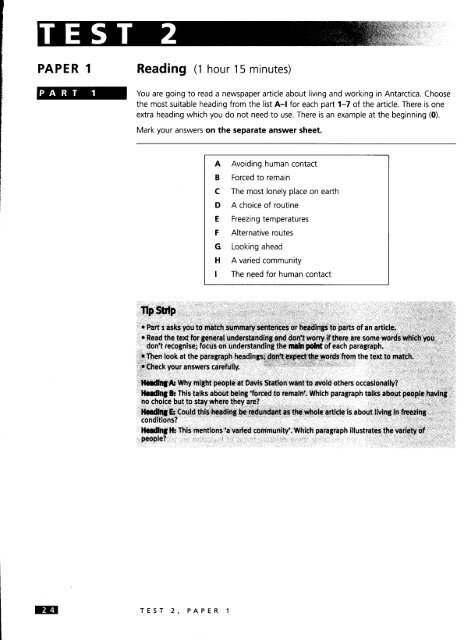
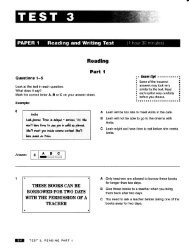
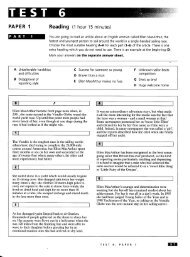
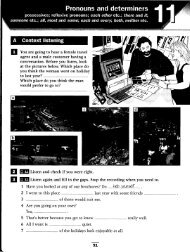
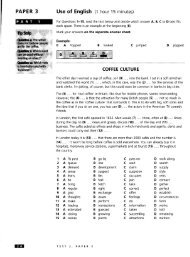
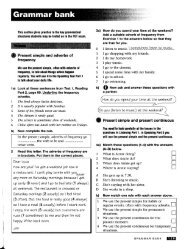
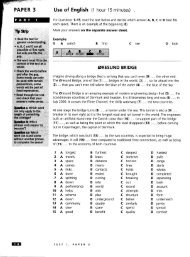
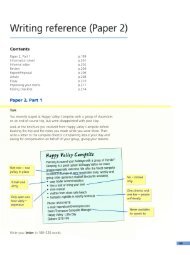
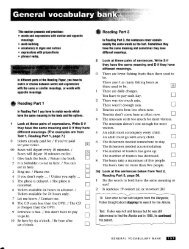
![T]NIT 9 A new look](https://img.yumpu.com/40125756/1/190x248/tnit-9-a-new-look.jpg?quality=85)
